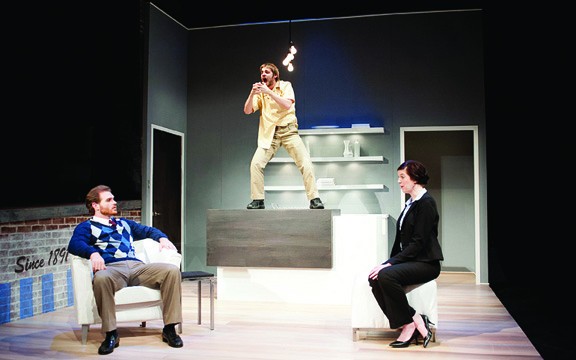When you hear a love song, what do you think? Do you fall deeply into the sweet melody that dips and rises or connect with the cliché words crooned by the singer? Does the anthem of love suddenly make sense of your life? Or do you need something more?
Arizona Repertory Theatre’s new play “Love Song” by John Kolvenbach is an atypically romantic show that follows a man named Beane as he encounters the peculiarities and realities of love.
Beane, played by Owen Virgin, a UA theatre production junior, is immersed in his oddball way of life, living alone in a grungy apartment. His sister Joan, played by theatre production senior Lauren Miller, and brother-in-law Harry, played by theatre production senior Cody Davis, seem to love him only out of familial obligation. They look out for his well-being, although they find his eccentricity hard to understand.
The play, directed by Laura Lippman, opens with Beane sitting in the corner of his apartment, one dim light pulsing while the ceiling seems to descend upon him. Left alone in silence, Beane appears trapped.
In contrast to Beane’s small, dingy apartment, Joan’s apartment is crisp, bright and obsessively neat. Harry and Joan enter from work in the middle of a quarrel, giving the audience a peek into a type of love that has its problems, even if it is lasting.
Both Harry and Beane remain calm during Joan’s continual tantrums, but it is Beane who earns the audience’s love and empathy.
Though Beane is just about as closed-off as a person can be, with his hands in his trench coat pockets as he stares at the floor, the more he opens up, the more the audience comes to empathize with him.
Then Beane falls in love with a female burglar named Molly, played by theatre production major Kate Nienhauser, who is dramatic and powerful in the ideological monologues she recites while stomping around Beane’s apartment.
“Harry! Jo! Look, I’m brand new!” Beane says, and it is obvious that he has been transformed by Molly and by love itself.
As long as they accept the mysterious new love between Beane and Molly, Joan and Harry are able rediscover their own passion through Beane and Molly’s happiness. It’s only when they begin to question the reality of Beane’s relationship with Molly that things begin to unravel.
Joan tries to defend her brother, but she knows the truth. And this raises the question: Can we let our family and relatives love and be loved by anyone they choose and are happy with?
If you’re skeptical of the typical romantic comedy genre, you’ll be delighted with “Love Song.”
The conversations are real and the actors perform them with genuine emotion and pacing, even owning the silences so you can almost see the characters’ thoughts running through their minds.
Though the piece features a small cast, the wide scope of emotions the actors portray makes it seem larger.
American culture is obsessed with the “now” — not a conducive mindset for forming lasting relationships. But “Love Song” brings to the stage a heartfelt and genuine picture of “forever” love.
With silences that pull the audience deeper into the emotions of the characters and crisp, natural dialogue, Kolvenbach presents the complexity of love in a single play.
“Love Song” is not just for the romantic. It showcases a breadth of genuine human relationships we can all connect with.









